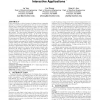Free Online Productivity Tools
i2Speak
i2Symbol
i2OCR
iTex2Img
iWeb2Print
iWeb2Shot
i2Type
iPdf2Split
iPdf2Merge
i2Bopomofo
i2Arabic
i2Style
i2Image
i2PDF
iLatex2Rtf
Sci2ools
138
click to vote
DAC
2005
ACM
2005
ACM
User-perceived latency driven voltage scaling for interactive applications
Power has become a critical concern for battery-driven computing systems, on which many applications that are run are interactive. System-level voltage scaling techniques, such as dynamic voltage scaling (DVS) and adaptive body biasing (ABB), have been shown to reduce energy consumption effectively. Previous works on DVS and ABB exploit low CPU utilization of the processor to drive voltage scaling. This has become inadequate for modern interactive applications involving high CPU usage. In this work, we target computer responsiveness during voltage scaling to exploit more opportunities for energy reduction. Instead of CPU utilization, we use the user-perceived latency, the delay between user input and computer response, to drive voltage scaling. Considering the tradeoff between energy consumption and computer responsiveness during voltage scaling not only reduces energy consumption effectively, but also ensures good computer responsiveness for interactive applications. Experimental res...
DAC 2005 | Design Automation | Latency Driven Dvs | Latency Driven Voltage | Voltage Scaling Techniques |
| Added | 13 Nov 2009 |
| Updated | 13 Nov 2009 |
| Type | Conference |
| Year | 2005 |
| Where | DAC |
| Authors | Le Yan, Lin Zhong, Niraj K. Jha |
Comments (0)

